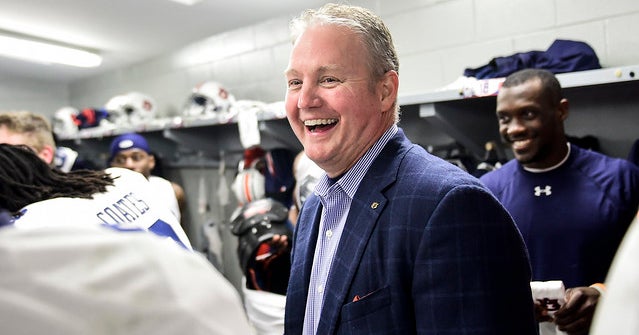NIL
Jay Jacobs on Auburn facilities, NIL pressure and what still sets the Tigers apart
Former Auburn athletic director Jay Jacobs joined The Auburn Undercover Podcast for his biweekly show for a deep dive into how Auburn built some of the SEC’s best facilities—and why staying competitive now requires more than just bricks and mortar. Jacobs, who led Auburn Athletics from 2005 to 2018, said the evolution of facilities is a story […]

Former Auburn athletic director Jay Jacobs joined The Auburn Undercover Podcast for his biweekly show for a deep dive into how Auburn built some of the SEC’s best facilities—and why staying competitive now requires more than just bricks and mortar.
Jacobs, who led Auburn Athletics from 2005 to 2018, said the evolution of facilities is a story of constant adaptation. “Auburn was the first school in the SEC to have a football building,” he said. “We built that athletic complex in 1989, and at the time nobody else had one. That set the tone for how we’d separate ourselves.”
But in today’s NIL-driven world, Jacobs believes facilities still play a crucial role. “There may be a mindset at some schools that you don’t need to build anymore, just pay NIL and figure it out. But if everyone’s paying NIL, you still need something to separate yourself. That’s where facilities matter.”
Jacobs said recent improvements—from Plainsman Park to Neville Arena—are about more than recruiting athletes. “We’ve all turned our attention to fans. If the fans aren’t there, it’s an empty, hollow place. That atmosphere has to be there for everyone.”
Still, progress isn’t easy. Jacobs recalled pushing for a north end zone project that didn’t gain traction during his tenure. “Obviously I didn’t do a good enough job painting the vision. But thank goodness they’re moving forward with it now.”
When asked about the pressures of NIL, Jacobs didn’t mince words. “I’ve never had a student-athlete demand more money. It’s always been a parent, guardian, or handler. I’ve seen cases where the student-athlete didn’t even know someone was negotiating on their behalf.”
Despite the financial changes in college sports, Jacobs says the Auburn spirit still shines through. “These kids still act like kids. They’re having fun, they’re dancing in the dugout, hanging off the bench. They’re not thinking, ‘How can I get $25,000 more?’ They just love to play.”
Looking ahead, Jacobs acknowledged the challenge of funding athletics once schools begin paying athletes directly as part of the expected House v. NCAA settlement. “Every school is going to have to come up with $20.5 million more, and then it goes up from there. That’s real.”
Yet Jacobs remains optimistic about Auburn’s donor base and approach. “We may not have one mega-donor, but we have a lot of people who care. That’s the Auburn way. Everyone pitches in.”
He closed with a recommendation: a book that’s helped him stay grounded. “It’s called Don’t Give the Enemy a Seat at Your Table by Louie Giglio. Whether you’re a Christian or not, it helps you catch those negative thoughts and think clearly.”
Listen to this episode elsewhere using these links.
APPLE PODCASTS
SPOTIFY
YOUTUBE MUSIC/PODCASTS
